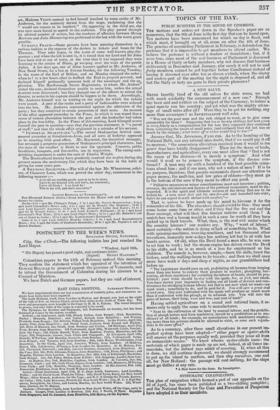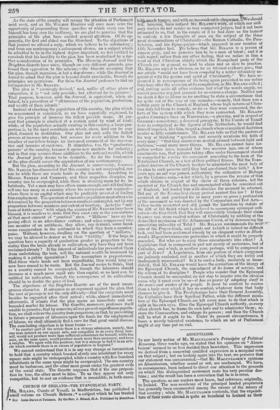SYSTEMATIC COLONIZATION.
THE plan of emigration which formed a part of our appendix on the 3d of April, has since been published as a two-shilling pamphlet; and the National Society for the Cure and Prevention of Pauperism have adopted it as their manifesto. As the state of the country will occupy the attention of Parliament next week, and as Mr. WILMOT HORTON will once more seize the opportunity of propounding those specifics of which every one but himself has long seen the inefficacy, we are glad to perceive that the principles of the plan have excited general attention. Of its op- POne.nts, the first and ablest was the Standard. To the objections of that journal we offered a reply, which we believe to be satisfactory ; and from our contemporary's subsequent silence, on a subject which he admitted to be in the highest degree important, we feel entitled to conclude that his hostility to the plan has been neutralized by a fur- ther consideration of its principles. The Morning Journal and the Bilghton Gazette have since, though on very different grounds, pro fessed their opposition to the scheme,—the Gazette assuming that the plan, though ingenious, is but a day-dream ; while the Journal is forced to admit that the plan is beyond doubt practicable, though its principles are pernicious. For these the Journal professes to find an extinguisher in Mr. SADLER. The plan is " cunningly devised," and, unlike all other plans of emigration, it is " not only possible, but effectual for its purpose." That purpose, however, adds the Jownal, is equivalent, when at- tamed, to a prevention of " all inerease of the population, production, and wealth of these islands."
Instead of checking the population of this country, the plan which we recommend is calculated, as we have repeatedly explained, to give the principle of increase the fullest possible scope. At pre- sent that principle is checked at a certain point by want of food; while, of the population actually existing in this country, a large pro- portion is, by the hard conditions on which, alone, food can be sup- plied, doomed to destitution. Our plan not only calls the fullest powers of increase into play, but secures for every addition to the • number of our fellow-beings an increased command of the necessa- ries and luxuries of existence. It stimulates, too, the " productive powers" of the country, because it opens new markets for industry ; and in that way secures those additions to the national wealth, which the Journal justly deems to be desirable. So far the tendencies of the plan should secure the approbation of our contemporary. But the plan, according to the Journal, is unnecessary, because Mr. SADLER has discovered that this country is not overpeopled, nor can be while there are waste lands in the country. According to Messrs. SA.DLER and CORBETT, and their respective disciples, no country can be overpeopled, while there is standing-room for its in- habitants. Yet a man may have elbow-room enough, and still find him- self one too many in a country where his services are not required— where there is no capital which may be profitably invested in finding bun employment. The question of excessive population must always be determined by the proportion between numbers and capital, not by any proportion between numbers and extent of territory. As to the " mil- lions of fertile acres" with which the visions of Mr. SADLER have been blessed, it is needless to state, that they exist only in the calculations of that most eminent of "practical" men. "Millions" have an im- posing effect in an after-dinner oration ; and when compressed into one member of an antithesis, they allow, nay demand, some hand- some exaggeration in the sentiment to which they form a counter- poise. Without, however, dwelling on the question of " we may be allowed to demur as to their "fertility." If the bogs in question have a capacity of production greater in proportion to the outlay than the lands already in cultivation, why have they not been reclaimed already ? If the interest of individuals has prevented them from undertaking the task, will the national wealth be increased by making it a public Speculation? The assumption is preposterous. Had these waste lands not been unprofitable, they would long ere now have ceased to be waste. But the Journal seems to think, that as a country cannot be overpeopled, though the labourers should increase at a much more rapid rate than capital, so no land canbe unfitted for cultivation, though the consequence of its cultivation should be to double the price of food. The objections of' the Brighton Gazette are of the most incon- gruous character. It advances as an argument against the plan, that the cost of passage is not the only difficulty—that the emigrants must beiides be supported after their arrival.; while, almost immediately afterwards, it admits that the plan opens an immediate and un- bounded market for labour. The Gazette, moreover, professes itself unable to perceive, that by removing all our present superfluous popula- tion, we shall relieve the country from pauperism; or that, by preventing in future 0. pressure of labourers upon the funds for the employment of labour, we shall ultimately find a cure for that great social disease. The concluding objection is in these terms :— "In another part of the article there is a strange admission, namely, that one man isolated on one square mile, and compelled, to do every thing him- self, would not produce more than sufficient subsistence for himself, while ten men, on the same space, would produce much more than necessary, and have a Surplus. We agree with this position; but it is strange to and it in an arti- cle Which contends there is an excess of population in England."
We cannot understand that it is in any way strange or inconsistent to hold that a country which boasted of only one inhabitant for every square mile might be underpeopled, while a country with five hundred inhabitants in the same space might be overpeopled. The one country must be barbarous, and the other must groan under the greatest evils of the social state. The Gazette supposes that if the one proposi- tion be true, the other must be false. To us they appear not only compatible, but to rest on evidence that is irresistible, in both cases.



















 Previous page
Previous page